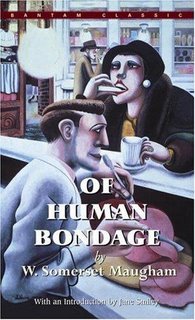 Another of the Modern Library novels down -- Of Human Bondage by W. Somerset Maugham.
Another of the Modern Library novels down -- Of Human Bondage by W. Somerset Maugham.Not half bad; as S and I lounged at Punjabi by Nature last night to celebrate one year since my return to India, we debated its merits. The writing is simple, clear, and the story is rather charming. And I'm always drawn to works that explore the meaning of art, the whims of circumstance, and the methods for coping with a feel that one stands outside the world (an aside: what novel DOESN'T that describe?).
My only criticism -- and it is a rather large one -- is that Maugham perhaps belabors the themes of slavery, freedom, etc. There is a fine line between alluding to one's ideas and explicating a doctrine; Of Human Bondage is so transparent that at times it seems Maugham is more interested in expounding his personal philosophies than letting the writing and story take care of itself. Shrug.
Choice quoties:
"Insensibly he formed the most delightful habit in the world, the habit of reading: he did not know that thus he was providing himself with a refuge from all the distress of life; he did not know either that he was creating for himself an unreal world which would make the real world of everyday a source of bitter disappointment."
"'As long as you accept [your deformity] rebelliously it can only cause you shame. But if you looked upon it as a cross that was given you to bear only because your shoulders were strong enough to bear it ... then it would be a source of happiness to you instead of misery.'"
"'I do not attach any exaggerated importance to my poetical works. Life is there to be lived rather than to be written about. My aim is to search out the manifold experience that it offers, wringing from each moment what of emotion it presents. I look upon my writing as a graceful accomplishment which does not absorb but rather adds pleasure to existence. And as for posterity -- damn posterity.'"
"The advantage of living abroad is that, coming in contact with the manners and customs of the people among whom you live, you observe them from the outside and see that they have not the necessity which those who practise them believe. You cannot fail to discover that the beliefs which to you are self-evident to the foreigner are absurd. ... He saw that nothing was good and nothing was evil: things were merely adapted to an end."
"He thought of Hayward and his eager admiration for him when first they met, and how disillusion had come and then indifference, till nothing held them together but habit and old memories. It was one of the queer things of life that you saw a person every day for months and were so intimate with him that you could not imagine existence without him; then separation came and everything went on in the same way, and the companion who seemed so essential proved unnecessary."
"Thinking of Cronshaw, Philip remembered the Persian rug which he had given him, telling him that it offered an answer to his question upon the meaning of life; and suddenly the answer occurred to him ... The answer was obvious. Life had no meaning.... Life was insignificant and death without consequence. ... for the first time he was utterly free. His insignificance was turned to power, and he felt himself suddenly equal with the cruel fate which had seemed to persecute him; for, if life was meaningless, the world was robbed of its cruelty. What he did or left undone did not matter. Failure was unimportant and success amounted to nothing."
"Life was before him and time of no account. He could wander, for years if he chose, in unfrequented places, amid strange peoples, where life was led in strange ways. He did not know what he sought or what his journeys would bring him; but he had a feeling that he would learn something new about life and gain some clue to the mystery that he had solved only to find more mysterious."
No comments:
Post a Comment